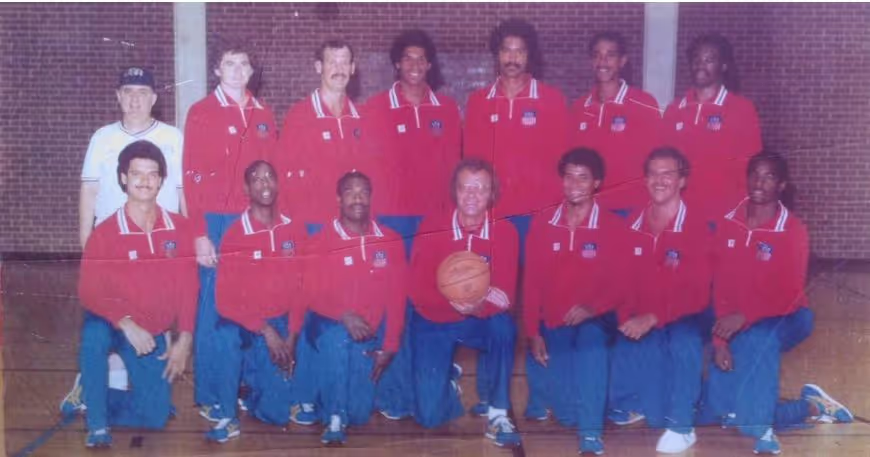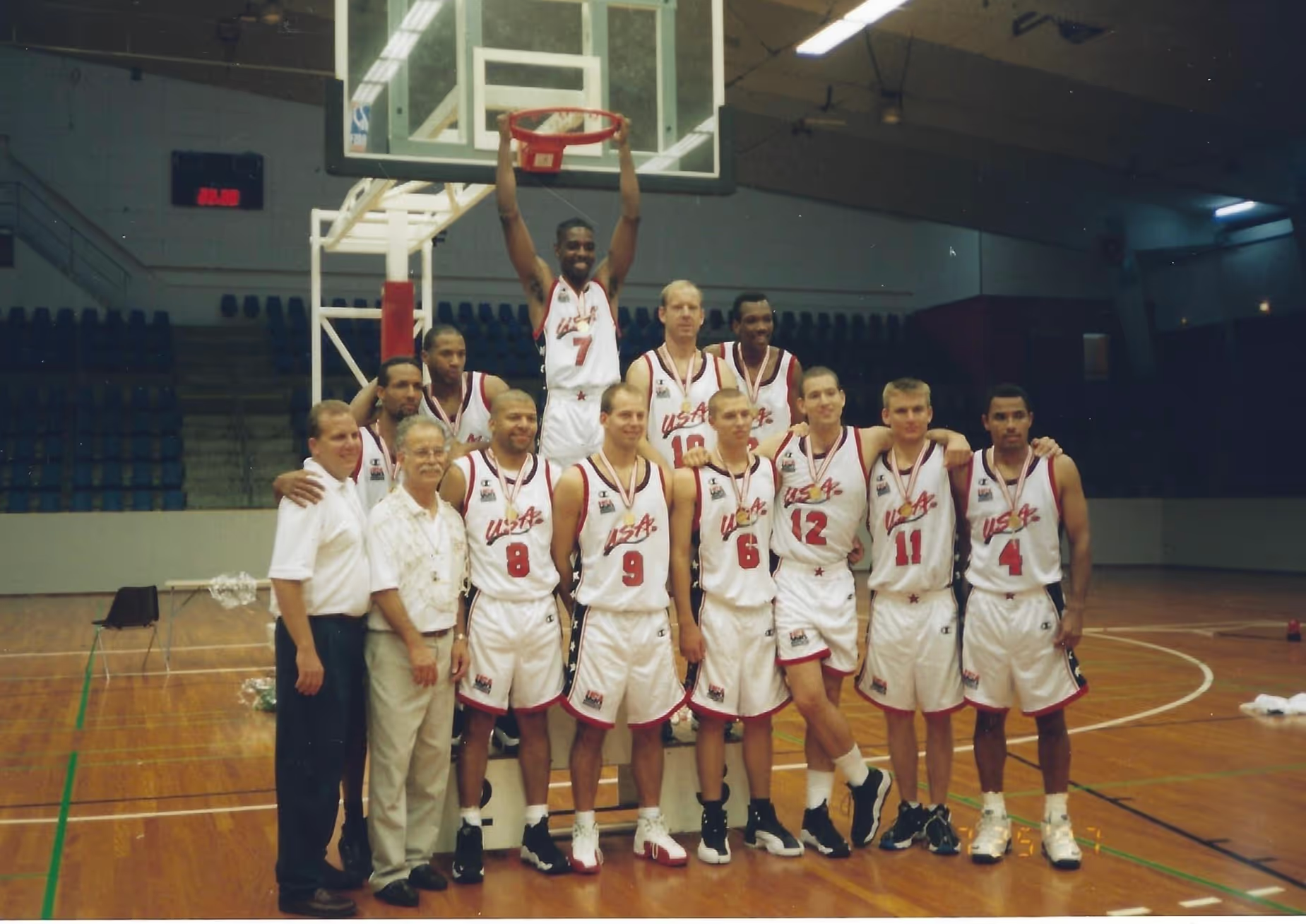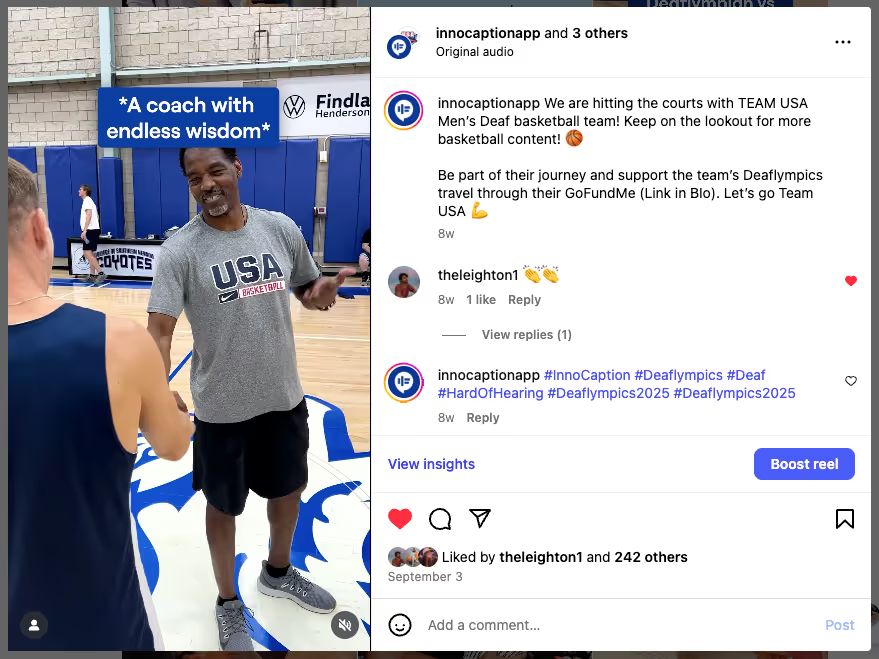Inside Team USA’s training camp, the rhythm is relentless: early morning conditioning, high-intensity drills, film sessions, and late-night strategy talks. Yet these weeks are defined by more than sweat and sprints; they’re shaped by connection—a glance on the court, a quick gesture, a burst of laughter over dinner.
At the center is Head Coach David Hamilton, a figure deeply familiar with this stage. A five-time Deaflympics gold medalist (Köln 1981, Los Angeles 1985, Sofia 1993, Copenhagen 1997, and Rome 2001), he later returned as head coach in 2005. Now, he leads a new generation, sharing the lessons he once learned as they prepare to represent Team USA on the world stage.
With decades of experience and a roster hungry for its shot at gold, Hamilton offers a rare glimpse into training camp, reflecting on the grind, the camaraderie, and the spirit that defines this team.

I have many great memories with USA Deaf Basketball, but the one that stands out most is my first Deaflympics in Germany. I was just 17 years old, the youngest player ever selected for the team and the only high school athlete among players who were in college or older. It was a huge honor. That trip marked my first time traveling overseas.
I was full of excitement and nerves, eager not only to compete but to represent the United States on an international stage. What I didn’t expect was just how much attention we received. The USA Men’s Basketball Team quickly became one of the most popular teams at the Games. Everywhere we went, people swarmed us, asking for autographs, taking photos, and treating us like celebrities.
At first, it was fun—really fun. I felt like a star. But as the days went on, the constant pace and attention caught up with me. There was always something happening and little time to slow down or take it all in. Still, those moments gave me a glimpse of what true respect feels like on a global stage—something I’ll never forget.
On the court, we dominated. Our team was incredibly talented, and most of our games weren’t even close. But it wasn’t just the victories that made it special; it was the pride we shared, the bond we built, and the unforgettable feeling of representing our country at such a young age.
It was fun being treated like a “celebrity,” even for a short time. But what stayed with me were the lessons it taught me about leadership, composure, and the honor of wearing “USA” across my chest.

Looking back, things were very different during my first Deaflympics. Back then, we didn’t train with the same intensity or structure that’s required today. The overall level of competition wasn’t as intense, and we knew we were likely to win every game and bring home the gold. That confidence didn’t come from arrogance; it came from knowing we were ahead of the curve.
But over the years, that’s changed. Other countries have caught up, and some have even surpassed us in preparation and support. Many of their governments invest heavily in national deaf sports programs, providing resources, training, and even financial incentives. Athletes from those countries can earn money if they medal at the Deaflympics, and that’s a big motivator.
Their players often live close to one another, train together consistently, and some even play professionally year-round. That gives them a clear advantage—they grow together daily, both on and off the court. Here in the U.S., our reality looks different. Our top deaf players are spread across the country, balancing jobs, school, and life while training independently. Even with those challenges, we’ve built a strong roster of the best deaf basketball players in the country. We know talent alone won’t get us there, so we prepare with the same hunger and discipline as any full-time program.
So far, we’ve held three training camps, with another scheduled in Riverside next month. After that, we’ll meet one last time in Tokyo, just before the Deaflympics begins. Each camp has been crucial, helping us strengthen our chemistry, sharpen communication, and reach peak physical condition.
To bring home the gold this time, we can’t rely on past dominance. We have to earn it. That means being well-conditioned, mentally sharp, and fully prepared. We know the competition will be tough, but we’re ready to rise to the challenge.
One of the biggest challenges we face as a national team isn’t about talent—we have that. We’ve got some of the best deaf basketball players in the country, many of whom were standout athletes on their teams in high school, college, or leagues. But putting a group of top players together doesn’t automatically make a great team.
The truth is, it’s hard to build team chemistry when we don’t get enough time to practice together. Everyone comes in with their own style, habits, and expectations. That’s why chemistry and knowing your role are absolutely essential. It’s not about who gets the spotlight or who scores the most points; it’s about how well we play together, support each other, and stay focused on one mission: winning gold.
The Deaflympics don’t give out individual awards. There’s no MVP, no All-Star Team, no Most Outstanding Player. Only one team walks away with gold, and that’s what we’re here for.
As coaches, it’s our responsibility to guide the team and help players understand that. But it’s also on every player to buy in. We have to respect one another, trust each other, and sacrifice personal glory for team success.
If we want to win a championship, it’s going to take teamwork, chemistry, and sacrifice. That’s the formula—that’s how we win.
One of the most memorable experiences we’ve had as a team was our training camp in Las Vegas last July. For three full days, we practiced together, stayed in the same lodging, and spent time hanging out as a group. It was more than just a camp; it was a real opportunity to build connection and trust.
Being together in that environment allowed us to learn more about each other—not just as athletes but as people. We shared meals, swapped stories, and started to understand how each person communicates and leads. That closeness built comfort and unity, which are essential for any successful team. Many of the players talked afterward about how much they enjoyed the experience and how important it was for our growth.
We also had the opportunity to work with InnoCaption, who joined us during camp to film and interview the players. Their team was incredibly kind, professional, and supportive, and our players had a great time interacting with them. It wasn’t just about being on camera—it was about showing the world who we are as a team and how we work together. InnoCaption later shared our story on their social media, helping shine a light on our journey and the dedication behind it.
That experience reminded us that visibility matters. It brought greater awareness to USA Deaf Basketball—not just as athletes but as a united group working toward a shared goal. Camps like this prove that championships aren’t built only in the gym; they’re built through connection, trust, and shared purpose.

After stepping away from USA Deaf Basketball for a few years, I came to a realization: I missed it. I missed the excitement, the challenge, the camaraderie, and the joy of coaching a team. I knew I still had something to offer, and I wanted to bring that energy and experience back.
Watching the USA team compete in the Olympic Games in Paris last summer stirred up old emotions. It brought back cherished memories from my time as a player and from my years coaching on the international stage. My playing days may be behind me, but I knew I could still contribute in a meaningful way as a coach.
USA Deaf Basketball has a rich history, full of both triumphs and setbacks. In 2013, we lost to Venezuela in the semifinals and brought home bronze. We didn’t participate in the 2017 Deaflympics in Turkey. Then, in the 2022 Deaflympics in Brazil, we finished with silver.
Each of those moments, victories and disappointments alike, has fueled my desire to bring this team back to where it belongs: standing on top of the podium with gold.
When I was selected as head coach for this cycle, I made a vow to myself: I would do everything possible to bring together the best team we could. I promised to prepare them not just to compete but to win. This team deserves nothing less.
We’ve worked hard. We’ve built a roster of top-level players, held multiple training camps, and focused on building chemistry and discipline. And we’re not done; we’ll keep pushing until we’re fully ready for the Deaflympics.
I’m excited. I’m proud. And I’m ready to lead this team—not just to play but to win.
My motto for the team is something I live by:
The 5 P’s: Proper Preparation Prevents Poor Performance.
That’s the standard. That’s the expectation. And that’s how we bring home the gold.

From the very beginning, I’ve told our players that it’s a privilege and an honor to wear “USA” across your chest. This is a once-in-a-lifetime opportunity—something many dream about but never get to experience. Being part of USA Deaf Basketball isn’t just about playing the game; it’s about representing our country, our community, and ourselves on the world stage.
We know we’re up against 11 other national teams, all coming in with the same goal: to win. For many of them, the motivation is clear. If they medal, they receive prize money from their governments, and that incentive drives their programs. They’re well-funded, well-trained, and many of their players have been competing together for years.
They’re not afraid of us anymore, and they shouldn’t be. They’ve beaten us before, and they believe they can do it again. To be honest, they might have some advantages—more practice time, tighter chemistry, and the ability to train together year-round. That’s the reality.
Here in the United States, we face a different set of challenges. We don’t receive government funding, and our players are spread across the country. We’ve only been able to practice together about ten times. That means self-discipline and personal accountability aren’t optional; they’re essential.
So we’ve found ways to close the gap. Every week, we hold Zoom meetings to talk about training, conditioning, running plays, and supporting one another. We share ideas, motivate each other, and stay connected even when we’re miles apart. That’s how we build a team when we can’t be in the same gym every day.
For us, this journey is about more than medals. It’s about memories that will last a lifetime. I want every player on this team to look back with pride and say, “I gave everything I had. I represented my country. I built lifelong friendships. I was part of something bigger than myself.” And I hope they pass those memories down to future generations, because being part of Team USA is a legacy.
InnoCaption provides real-time captioning technology making phone calls easy and accessible for the deaf and hard of hearing community. Offered at no cost to individuals with hearing loss because we are certified by the FCC. InnoCaption is the only mobile app that offers real-time captioning of phone calls through live stenographers and automated speech recognition software. The choice is yours.